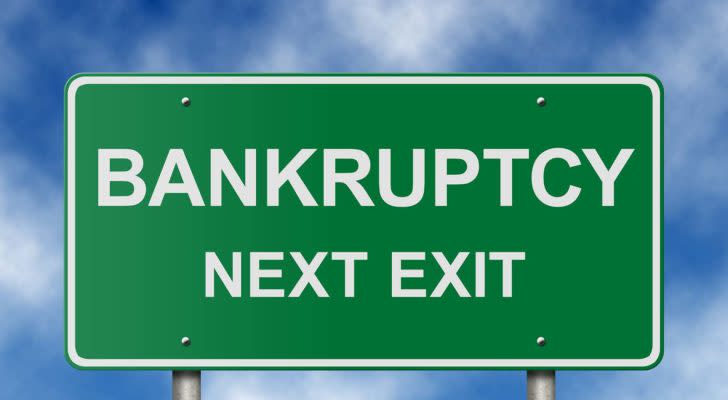7 Stocks Most Likely to Follow in WeWork’s Woeful Footsteps
WeWork’s (OTCMKTS:WEWKQ) spectacular failure and recent bankruptcy filing should serve as a cautionary tale for many other troubled stocks. It should also serve to renew efforts to reassess one’s portfolio and drop stocks that are bound to act as detractors overall.
Investors don’t want to keep their capital behind those stocks, most likely to follow in WeWork’s footsteps. That path led the firm, once described by CEO Adam Neumann as “the world’s first physical social network,” from a peak valuation of $47 billion to $44 million at the time of its Chapter 11 restructuring plan. Overlaying Silicon Valley flash and new-age arrogance onto simple business models like office space leasing doesn’t work.
It also gives investors a good reason to reassess their respective holdings.
InvestorPlace - Stock Market News, Stock Advice & Trading Tips
Troubled Stocks: Mullen Automotive (MULN)

Source: Ringo Chiu / Shutterstock.com
Mullen Automotive (NASDAQ:MULN) is not far behind WeWork and is the clearest EV stock disaster waiting to happen.
The EV manufacturer is amongst the most highly distressed firms with a relatively high profile that are listed. The company reported $308,000 in revenues in Q3, leading to a $308.86 million net loss. It’s basically trying every trick in the book as it attempts to avoid the inevitable bankruptcy ahead. This includes reverse stock splits, plus multiple efforts to keep its shares listed on the Nasdaq, and more.
Nevertheless, none of it works, and Mullen Automotive is no closer to bringing its stock price above $1. Instead, share prices continue to move steadily nearer to $0 and currently trade at $0.22. It began 2023 trading at $85. Needless to say, Mullen Automotive is an ongoing disaster of epic proportions. Investors are only continuing to hold on because MULN shares have cost them so much already. Avoid them at all costs.
Aurora Cannabis (ACB)

Source: Ralf Liebhold / Shutterstock.com
I’ve remained highly skeptical of Aurora Cannabis (NASDAQ:ACB) and its stock for the last several months and beyond.
Canadian cannabis stocks had an early lead on their American counterparts as legalization has lagged in the latter nation for years. Firms like Aurora Cannabis garnered a lot of attention because of it. Share prices soared on the expectation of massive profitability from a plant that benefited from the high margins that come with illegal status.
The world of theory often differs from the world of practice. And in practice, Aurora Cannabis, like so many others, has not found profitability.
The failure to find profits has led to cost-cutting measures that haven’t done much. Aurora Cannabis lost $206 million CAD in its most recent filing period. Its shares trade well below $1 at present. The only hope for it and other firms like it is that peak rates are near or at hand. However, I think investors should instead look at the few profitable cannabis firms available instead of investing in ACB’s ability to pile on more debt at lower prices.
Troubled Stocks: Ginkgo Bioworks (DNA)

Source: T. Schneider / Shutterstock.com
Ginkgo Bioworks (NYSE:DNA) is a biotech stock that is bound to be controversial for investors. That’s mostly true for the sector overall: You either expect huge losses or huge returns with little in between.
A point of difference with Ginkgo Bioworks is that it is industry agnostic, whereas most biotech firms operate in the pharmaceutical sector. Instead, it serves the agricultural, food, chemical, and pharmaceutical sectors. The firm’s technology promises to allow its users to program cells as easily as programmers do computers.
However, Ginkgo Bioworks continues to head in the wrong direction. Through the first nine months of 2023, revenues fell by 43%. The company lost more than $681 million during that period. So, the fact that the company boasted that it has more than $1 billion in liquidity doesn’t actually mean much. Sure, a lot of investors have put their money behind the firm, but don’t think for a second that those who provided that $1 billion are happy or quiet at the moment. They’re worried and angry that the company won’t ever succeed, and they very well might be right.
Virgin Galactic (SPCE)

Source: rafapress / Shutterstock.com
Virgin Galactic (NYSE:SPCE) is an exciting company when all is said and done. After all, what could be more exciting than going to space? Commercial space flight is the next frontier of the final frontier, and that’s what Virgin Galactic does: It is commercializing space tourism and continues to make meaningful progress in its efforts to do so.
As interesting as that is, it’s not proving to be financially viable as a business model. Virgin Galactic isn’t in any immediate danger following its Nov. 8 Q3 earnings release. In fact, those results were largely heralded positively by the market. Six space flights in six months is an impressive feat, given the early stage of development in the industry overall. Virgin Galactic deserves recognition for that monumental achievement.
Further, the company telegraphed positive cash flow in 2026 in its earnings statement. However, it lost $105 million overall while taking in $1.7 million in sales. It has a long way to go, which will require a lot of cash. Despite management’s rosy projections, there’s a lot that could go wrong financially or otherwise between now and 2026.
Troubled Stocks: Amicus Therapeutics (FOLD)

Source: Shutterstock
Amicus Therapeutics (NASDAQ:FOLD) stock isn’t in any immediate danger of bankruptcy. Further, the analysts covering FOLD shares believe that it could basically double in price in the future. All that said, I believe FOLD shares will continue to head downward.
Investors may be surprised at that idea. Amicus Therapeutics does have a reasonably strong product portfolio. Its lead drug, Galafold, passed $100 million in revenue, growing by 23% in the quarter. The drug combination Pombiliti and Opfalda was approved and launched in the U.S., E.U., and the U.K. during the period.
However, Amicus Therapeutics is only expected to be minimally profitable beginning in Q4. I believe that’s the primary issue with FOLD stock and the main reason that it will stagnate. Beyond that, the firm’s sales didn’t increase by much in the quarter when you take into consideration how many things went right overall. Again, it’s not on WeWork’s level, but it is worth mentioning for investors who might be considering the stock.
Lyft (LYFT)

Source: Tero Vesalainen / Shutterstock.com
A recent Wall Street Journal article highlighted the idea that Lyft (NASDAQ:LYFT) is losing the battle for ride-hailing stock dominance with Uber (NASDAQ:UBER). The overall thrust of that article is that Uber is better funded, has greater scale, and is more profitable. Actually, Lyft isn’t profitable, while Uber is. The idea that Uber is more profitable might falsely lead investors to believe that Lyft is profitable, though it is not.
Lyft has essentially undertaken an incredibly massive effort in order to approach profits. It reported $1.1576 billion in sales in Q3, leading to a $12.1 million loss. It isn’t yet profitable, while Uber reported $221 million in net income during the same period. It’s going to increasingly become a battle between Uber and taxis moving forward.
I wouldn’t even necessarily invest in Uber despite its success so far. It’s done better than Lyft, but it has taken a lot of money to replace the traditional taxi, and it’s not even clear that the consumer has benefited. Thus, it is one of my top picks regarding troubled stocks.
Peloton (PTON)

Source: JHVEPhoto / Shutterstock.com
I truly dislike everything Peloton (NASDAQ:PTON) represents as one of the troubled stocks. The single saving grace of the firm is that it has helped some people to become healthier and created a zeal for fitness in the population.
Peloton as a company is a joke. Investing hundreds of millions of dollars to jack up the price of its exercise bicycles and increase its class offerings is all the company was ever about. The narrative of its ascendance has been told again and again. The pandemic allowed it to boom, and its end also spells the end of Peloton.
My view here may be cynical, but I’ll state it anyhow: Adding all the digital technology in the world isn’t going to change Peloton’s inherent offering. People will choose to exercise or they won’t. The pandemic is over, and people can choose to do that wherever they want to again. You certainly don’t need to spend $2,000 for a Peloton brand bike and then more for classes in order to get fit. That’s why I dislike Peloton so vehemently and fully expect it to fail in the end.
On the date of publication, Alex Sirois did not have (either directly or indirectly) any positions in the securities mentioned in this article. The opinions expressed in this article are those of the writer, subject to the InvestorPlace.com Publishing Guidelines.
Alex Sirois is a freelance contributor to InvestorPlace whose personal stock investing style is focused on long-term, buy-and-hold, wealth-building stock picks. Having worked in several industries from e-commerce to translation to education and utilizing his MBA from George Washington University, he brings a diverse set of skills through which he filters his writing.
More From InvestorPlace
ChatGPT IPO Could Shock the World, Make This Move Before the Announcement
Musk’s “Project Omega” May Be Set to Mint New Millionaires. Here’s How to Get In.
The Rich Use This Income Secret (NOT Dividends) Far More Than Regular Investors
The post 7 Stocks Most Likely to Follow in WeWork’s Woeful Footsteps appeared first on InvestorPlace.
